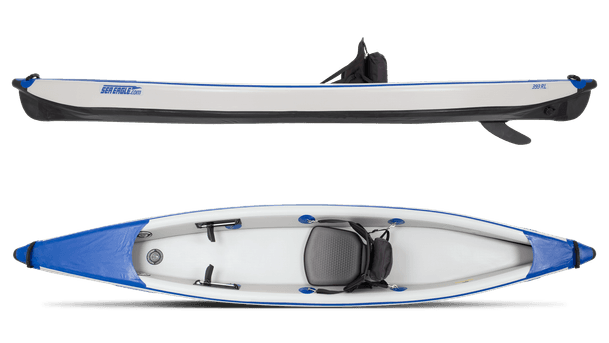- Home
- Profile
Profile
Name: KeithGD
Most Recent Reviews
Build quality is as good as you'd expect for an IK costing over $1,000. It's well made.
The manual pump is impressive. Inflating all three chambers to 10 psi takes me only about 5 mins.--around 75 strokes per chamber. At 28 lbs., the boat is easy to carry.
When I got in for the first time, I was surprised at how tippy it felt. This is not your typical IK barge with round pontoon hulls, and I would be hesitant to lend it to a beginner. Under way, with my weight centered, the RazorLite feels quite stable. It has a flat bottom, but the bottom just isn't very wide, and it tapers towards bow and stern. If I shift my weight to one side past a certain point, the boat will lean suddenly and get my attention very quickly. I haven't yet tested the limits of its secondary stability to see how readily it will roll over.
I prefer to paddle with my knees raised. The seat is OK at first, but after about an hour it feels hard. I had to grasp the gunwales and lift my butt off the seat to restore circulation. In view of the tippiness, I'm reluctant to raise my center of gravity with much extra padding.
Sea Eagle provides a strap and a PVC pipe as a footrest, but I found it supports only my heels. I built myself a small wooden footrest to replace the pipe.
Sea Eagle promotes the boat as fast, capable of 5 mph. Paddling fairly hard but not all-out, I saw about 4 mph on my GPS. I was more comfortable cruising at around 3.5 mph. However, breeze and current made it hard to gauge speed through the water accurately, and I'm not yet sure how much faster the RazorLite is than my FastTrack.
One thing I'm sure about: tracking is outstanding, with very little yaw. The sharp bow and stern, together with the rear skeg, keep the boat gliding straight. It tracks much better than my other IKs or my Inuit hardshell, yet it's at least as maneuverable as they are. It turns easily with paddle strokes. I don't yet know whether it will hold an edge or allow leaned turns - which would be remarkable in an IK - or whether it will just capsize. (Hey, I'm on the water in February, in the Rockies, without a drysuit!)
The drop-stitch sidewalls of the hull are relatively narrow, and the boat collects more water off paddle blades than my FastTrack does. Also, this is not an easy boat to dry after a trip. On the FastTrack, the drop-stitch floor pulls out when deflated, and you can get a sponge or towel to all the crevices. On the RazorLite, each side of the drop-stitch floor is tape-welded permanently to the hull's side walls. I'm sure the designers had good reason to do that, but it means you can't get underneath the floor chamber with a towel. The two drain holes just forward of the skeg are specifically for clean-out, not for self-bailing, so they need to remain closed when on the water. They help when draining the boat after a trip, but water collects in the stern, under the dark blue aft deck.
The RazorLite has a hard-plastic bow and stern, inside of which is a grid of plastic dividers. They provide rigidity, but they create a series of deep pockets that retain water (and would collect sand and mud, too, I imagine). It's a little awkward to reach in there and clean them out. Flipping the boat drains much of the water but not all. I've used a sponge and towel. A ShopVac might help, too.
Pros:
well-built; tracks amazingly well; maneuvers well; feels pretty fast; feels stable unless leaned; inflates quickly; weighs only 28 lbs.
Cons:
tippy when leaned; difficult to clean and dry the inside; uncomfortable seat after an hour.
